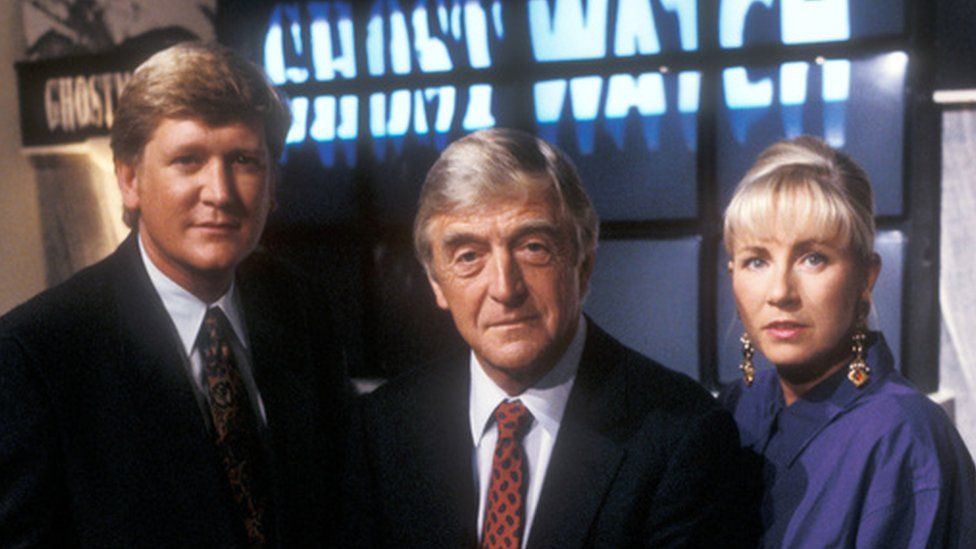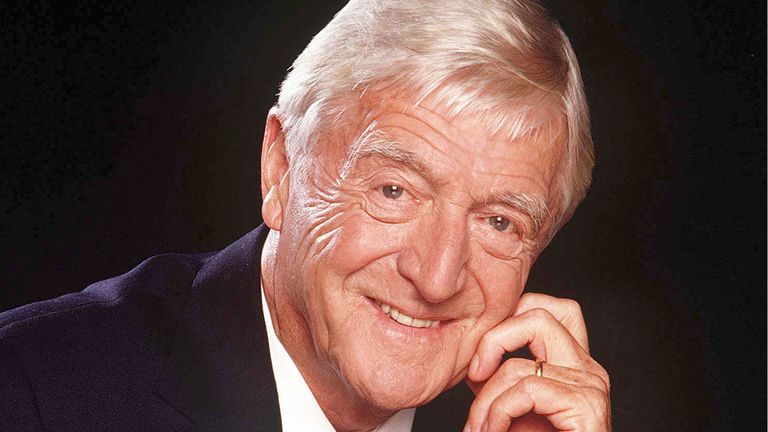
Team Grimmfest were deeply saddened to hear that Michael Parkinson has died aged 88. He was best-known for presenting talk show Parkinson from 1971 to 1982 and 1987 to 2007, on which he interviewed countless high-profile guests, from Madonna to Muhammad Ali.
He also appeared in two horror properties. In 1974, he featured in Amicus film MADHOUSE, in which Vincent Price plays Paul Toombes, a successful horror star renowned for playing killer Dr. Death. After his fiancé is murdered by a man dressed as his character, he spends several years in a psychiatric unit, unsure of whether or not he was responsible. Twelve years later, he travels to London to discuss the production of a Dr. Death television programme with the BBC. There, to mark the relaunch of his career, he is invited onto Parkinson, where Parky, as he was affectionately known, portrays himself. It is a brief but strong performance delivered with impressive naturalism.
But among horror fans, it is 1992’s GHOSTWATCH for which Parkinson is most beloved. Written by Stephen Volk and directed by Lesley Manning – the first woman to direct horror for the BBC – the drama takes the form of a live outside broadcast investigating a haunting in the home of Pamela Early and her daughters, Suzanne and Kim, in Northolt, London.
Parkinson takes on a leading role here, lording over a BBC studio, where he is joined by Mike Smith, host of gameshow That’s Showbusiness, while Smith’s wife, Sarah Green of Going Live!, joins Craig Charles of Red Dwarf at the Early household.
Parkinson interviews paranormal investigators and sceptics and fields calls from fictional viewers with characteristic command, delivering probing questions and introducing levity into tense situations with the same sense of innate ease as he demonstrated on Parkinson. It is an excellent performance that speaks to the strength of his collaboration with Volk and Manning.
Before GHOSTWATCH had even finished airing, it attracted controversy, with many viewers believing it to depict a genuine investigation – and one that ended in the BBC studio being destroyed, Greene being trapped and possibly killed and Parkinson being possessed. Throughout the drama, a number also used on programmes like Crimewatch was displayed on screen, and figures suggest that the BBC received up to one million calls during GHOSTWATCH’s 90-minute running time – many of them complaints.
Shortly afterwards, producer Ruth Baumgarten and executive producer Richard Broke appeared on audience response programme Bite Back to respond to feedback in person, staunchly defending the drama’s artistic merits and questioning the BBC’s decision to distance themselves from it (it has never been repeated to this day!).
Fascinatingly, Parkinson fell at the centre of much of this controversy. One Bite Back participant said that “Michael Parkinson is a well-respected and mature fatherly figure,” leading him to presume that the programme was suitable for his children, who were terrified. In 2012 documentary GHOSTWATCH: BEHIND THE CURTAINS, a fan likewise recalled that “everyone just was playing their ordinary roles, and so it didn’t seem out of the ordinary, and you were like, ‘It must be true because… Parky wouldn’t lie!’” Volk even shared an anecdote about a friend of his who knew he had written it but was still fooled by it and, when he asked how, replied, “Well, when I saw Michael Parkinson.”
For Volk, Parkinson’s casting was key to the drama’s success. As he noted in BEHIND THE CURTAINS: “If you’re interested in the construction of horror films, it’s often about everything that makes you feel safe being stripped away, gradually, and really, that’s the structure of Ghostwatch… Finally, the ultimate authority figure, Parky, is completely kiboshed at the end.”
In the face of controversy, Parkinson remained steadfast in his support for GHOSTWATCH. “You always get a certain percentage who believe everything on TV is real,” he told Robert Rickard of Fortean Times shortly after the drama aired. “If people were scared, we did our jobs well.”
GHOSTWATCH is centrally concerned with who we trust and why we trust them, and while Pipes the poltergeist may not be real, the danger of placing uncritical trust in everything we see on screen very much is, particularly in the age of artificial intelligence and deepfakes. Having spent his entire career in the media, Parkinson was intimately aware of its power over populations, and nobody could have been better suited to delivering Volk’s prescient message.
Parkinson is survived by his wife, presenter Mary Parkinson, and their three children.
